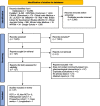Community-based non-pharmacological interventions for pregnant women with gestational diabetes mellitus: a systematic review
- PMID: 36447189
- PMCID: PMC9710028
- DOI: 10.1186/s12905-022-02038-9
Community-based non-pharmacological interventions for pregnant women with gestational diabetes mellitus: a systematic review
Abstract
Background: Non-pharmacological interventions are the first line of Gestational diabetes mellitus (GDM) management. Community-based interventions are cheaper, more accessible, with higher patient satisfaction.
Objectives: To systematically review community-based non-pharmacological interventions and evaluate their effectiveness for GDM.
Search strategy: Twelve bibliographic databases and reference list of related studies from inception until January 2022.
Selection criteria: All primary studies of community-based non-pharmacological interventions for GDM reported in English which investigated any behavioural or clinical outcome(s).
Data collection and analysis: Data were extracted using modified Cochrane's data extraction template. Studies were evaluated using Cochrane Collaboration's risk of bias tool. Narrative synthesis was used to summarise findings. This study is registered with PROSPERO (CRD42021257634).
Main results: Twenty-seven studies involving 6,242 pregnant women with GDM investigated self-management programmes, medical nutrition/diet therapy, exercise/physical activity, combined diet and exercise, calcium plus vitamin D supplementation, and continuous glucose monitoring. Self-management programmes were more effective than routine care in improving self-efficacy, two-hour postprandial blood glucose, and lifestyle behaviours but were as effective as routine care in improving infant birth weight. Self-management programmes were superior to or as effective as usual care in improving fasting blood glucose, blood glucose control, glycated haemoglobin, macrosomia, and preterm delivery. Medical nutrition/diet therapy was more effective than usual care in improving postprandial blood glucose levels. Postprandial blood glucose levels were better improved by regular supervised exercise plus daily brisk walks or a daily walking intervention than routine obstetric care or no treatment. The effects of exercise/physical activity programmes were mostly inconsistent for other outcomes. Diet and exercise were superior to diet alone in reducing maternal weight gain although there were similar outcomes for other pregnancy and foetal outcomes. Limited or conflicting evidence was found for other outcomes and interventions including calcium and vitamin D supplementation and continuous glucose monitoring intervention.
Conclusions: Community-based non-pharmacological interventions are more effective than placebo; and are more or as effective as usual care. Self-management programmes and medical nutrition/diet therapy had the most promising GDM outcomes.
Funding: There was no funding for this study. The study design, data collection, data analysis and interpretation, and writing of this manuscript were not influenced externally by any funder.
Keywords: Community-based; Gestational diabetes mellitus; Meta-analysis; Non-pharmacological; Pregnant women; Systematic review.
© 2022. The Author(s).
Conflict of interest statement
The authors declare that they have no competing interests.
Figures
References
-
- McIntyre HD, Catalano P, Zhang C, Desoye G, Mathiesen ER, Damm P. Gestational diabetes mellitus. Nat Rev Dis Prim. 2019;5(1):1–19. - PubMed
Publication types
MeSH terms
Substances
LinkOut - more resources
Full Text Sources


